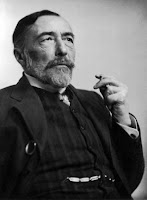
Marlow, the storyteller, talks on and on, describing each detail of his travels. It is clear that he still lives in the past even though, it appears, to have been quite a long time ago. Yet as he relates what happened to the drifting, and possibly sleeping, men, some statements reveal much about his character, and who he is as a person.
His loneliness shines through when he says: "we live, as we dream - alone..." (p. 95). Did he never settle down, and stop traveling? Does he not have family? Right now, he is speaking mainly to himself, with no interuptions from his companions, was this a silent cry for compassion? Is he looking for more to life than just his past?
Later on, he says: "I don't like work - no man does - but I like what is in the work - the chance to find yourself." p. 97. Considering that this man has already traveled to different places, and returned, it is most likely true that he is in his later years. Therefore, why would he still be trying to find himself? Or maybe, he is reflecting on the way he found himself so many years ago, with his hard work.
When he accounts: "To tear treasure out of the bowels of the land was their desire, with no more moral purpose at the back of it than there is in burglars breaking into a safe" p. 99, we see how the environment affected him. No longer did he simply pass by, absorbing what was going on, now he starts to judge and make his own remarks to what others are doing. Before hand, he merely took note of what was going on. Now, he is reacting. This shows growth as a character.
Not only is he reacting to people, he is also becoming more sensitive to the feelings within the community, shown with this quote from page 103: "And this stillness of life did not in the least resemble a peace."
What is Marlow trying to show his companions with these stories of his passed experiences? Is he warning them? Or is he just trying to relive his youthful days?
I went back to the beginning of the book, to see what led Marlow to this recollection, and realized that his first sentence did not seem to stand alone very well: "And this also has been one of the dark places of the earth" (p.67). Then, confused, and not remembering this part very well, I read on to see how his companions responded: "His remark did not seem at all surprising. It was just like Marlow. It was accepted in silence. No one took the trouble to grunt even; and presently he said, very slowly -- " (p. 68).
Now having this fresh in my head, I am receiving a slightly different picture of Marlow. He is probably like an old grandfather, his mental health slightly declining, but his respectable status amongst his companions ever remaining the same, for his great span of knowledge and past experiences.

No comments:
Post a Comment